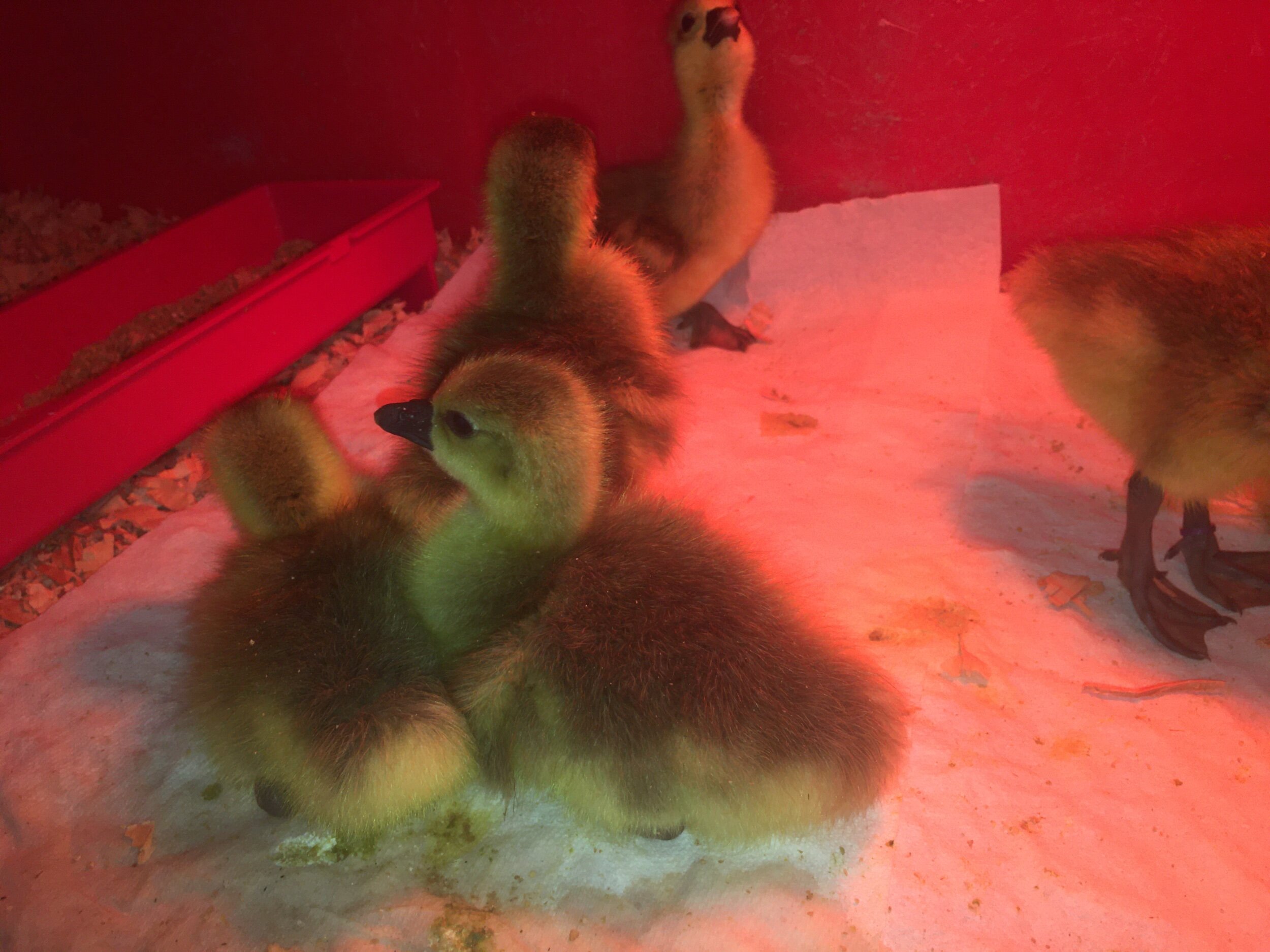There’s tired, and there’s “can’t do another dang thing” tired. We just experienced our craziest week at Star & Sparrow, other than the first real snow, and it left me begging for mercy. Mostly, it all boiled down to birds and bees.
The Birds
Bryon and I talk about birds in our house a LOT. You’ve probably gathered that if you’ve been following our adventures for any amount of time. But we took it to a new level recently. In the past week or so, we experienced some major milestones in the poultry sector:
A couple of chirping boxes arrived at the post office Wednesday morning, filled with three kinds of chickens, two kinds of ducks, and geese and turkeys. They all arrived alive, to my relief, after concerns over delivery delays. We did lose a few chicks over the next few days, but that isn’t abnormal. Overall, everyone seems healthy and happy.
We hatched our first baby Chinese geese. Unfortunately, a power outage caused our incubator to go haywire, so Bryon created an alternative to save the two goose eggs that had already started pipping. One was further along and hatched pretty quickly, but the other took longer, since keeping the humidity as high as needed was difficult. The first Chinese gosling joined the French Toulouse goslings from the hatchery in their brooder.The second gosling was noticeably weaker than the first. Sadly, it didn’t make it. Having cared for it singularly for several days made this loss much harder than the ones from the large shipment.
One of our Muscovy hens hatched our first ducklings not from an incubator. Dark Chocolate has been a dedicated bird mama, rarely leaving her nest the past month. The other day she went to eat, and Bryon alerted me to the babies in her wake. I dropped my trowel and ran to see the little balls of fluff. It looks like a couple might be a cross between Welsh Harlequin and Cayuga. (Here’s more about how I had to replace her eggs with other fertile duck eggs.) Other Muscovy hens are acting broody, and now that we have a drake, we hope they can hatch their own eggs next time.
In addition, we spent time relocating birds, dealing with a duck injury, and planning for an upcoming delivery of 100+ bags of organic feed from Canada. So... what’s the point of all this? Sometimes I ask myself that same question, especially when the mountain of eggs continues to grow faster than I can find customers. But the thing is, we are trying to build something bigger than the sum of its parts, and that takes time.
Purpose one: creating an Easter basket of egg layers. We already have white, brown, blue, and green egg layers, but our new French Black Copper Marans will add dark brown eggs. And we hope to experiment with crosses that lead to dark green and other hues in the future. Purpose two: filling our freezer with delicious, quality meat. Our previous experiences prove that nothing store-bought can come close. The new batch of Speckled Sussex chickens will be our dedicated meat birds (rather than the fast-growing Cornish cross that are most commonly raised for meat). We also look forward to having our first farm-grown duck in the next couple months. And this year, there will be a Christmas goose. Purpose three: eventually growing our business to sell more eggs, extra birds, and maybe one day finally host the farm-to-table dinners I’ve imagined for so long.
The Bees
We’ve now had our bees for one year, and I still feel a bit like a poser when it comes to beekeeping. All the animals are hard work, but bees can be baffling. We lost one hive last fall, and I’m not sure why. Maybe we waited too long to treat for varroa mites. Maybe it was the yellow jackets’ relentless attacks, despite our best efforts. One hive didn’t make it through the winter, and I don’t know why. We had added quilt boxes to absorb extra moisture and fed the bees sugar fondant to sustain them through the cold, and that hive still had lots of honey frames when I realized it didn’t make it.
For our one hive that did survive, I had hoped to split it into two, per suggestions from a beekeeping group. Before we could do that, though, the bees decided to swarm. So we captured the swarm, moving them into the empty hive. We then took out some of the extra frames of honey, rearranged the other frames, then moved the bees to a better location, away from the birds and constant mowing and other activity. I planted a little bee-friendly garden nearby with borage, bee’s friend flowers, echinacea, bee balm, lavender, and zinnias.
I finally got to reap my sweet rewards. Diligent beekeepers won’t take honey from the hives their first year, bettering their chances of survival. (Though sometimes you lose them anyway.) Bryon helped set up the extractor, and I spent a few sticky hours uncapping the honey, spinning the frames, and repeatedly washing my hands and tools. Once the last bit of honey was filtered, we ended up with almost two gallons. The next day I spent another couple of hours sterilizing and filling jars with the golden nectar. Plenty for ourselves with extra to share or barter. Or incorporate into a farm dinner one day.
Hungry, anyone?











